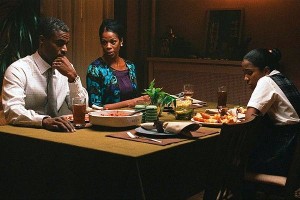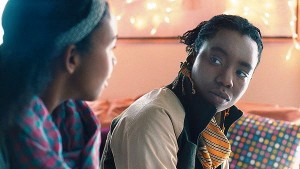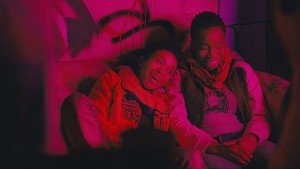
Filmmaker Dee Rees (a protégé of Spike Lee) has expanded on and refashioned her quasi-autobiographical 2007 short film Pariah for her feature debut—and a pretty terrific debut film it is. It’s smart, heartfelt, savvy, beautifully acted—and clever enough at 86 minutes not to overstay its welcome. It also has the good sense to inject a certain amount of (not always entirely comfortable) humor. And possibly the best thing about the film is that it feels at least a little bit like an independent film from the days when that label wasn’t interchangeable with mean, drab-looking, dreary, dour dramas.

The film stars Adepero Oduye (who played the role in the short) as Alike (ah-lee-kay), a Brooklyn teenager, a good student and a hopeful poet with a solid middle-class family. Alike is also a closeted lesbian who is not only stifled by a life that causes her to “feminize” herself on her way home, but also by the fact that she’s never had any kind of sexual relationship. Her parents, Audrey (Kim Wayans) and Arthur (Charles Parnell), are in a state of what can best be called willful denial. Yet, it’s clear that they really know what the score is—why else is Audrey so dead set against Alike having the obviously lesbian Laura (Pernell Walker, also reprising her short-film role) for a friend?—but the issue is scrupulously avoided in a kind of “ignore-it-and-maybe-it-will-go-away” manner.

For that matter, Alike—aware that Laura’s own mother has completely disowned her daughter—is neither anxious to out herself, nor is she wholly comfortable with Laura’s lesbian-nightclub scene. Alike resents her own mother’s intrusion into her life by trying to fix her up with a more “appropriate” (mom thinks) friend, the daughter of one of her churchgoing friends. Resent it all she likes, she still puts up with it because there’s simply not much choice. Imagine her surprise when this daughter, Bina (Aasha Davis), turns out to be completely different than Alike expects. This creates a situation more disillusioning, even more heartbreaking, than her original fears—but it’s exactly the kind of pitfall apt to ensnare any relationship novice, gay or straight.

You’re probably thinking that both coming-of-age and coming-out movies have been done to death one way or another. Whether or not that’s true, I have to say I’ve never seen either one done quite the way Pariah is. There’s a freshness and vibrancy here—and it also gets into an area that I’m not sure has ever been as directly addressed as it is here. I refer to the aspect of a mother whose religious convictions preclude any degree of acceptance of or further interest in her daughter—apart from praying for her—once the truth comes out. This is where I think Roger Ebert errs in his belief that the word “pariah” is too “loaded” a word for the title, because as far as Alike’s mother is concerned that is exactly what Alike is—and, unfortunately, she isn’t alone in that perception. See this often-remarkable little film. Rated R for sexual content and language.




Strong performances all around and a lot of nice little details, such as Alike changing into her boyish clothes in the school bathroom, are subtle yet powerful. However, the film never quite comes together for me. I enjoy the gritty, realist style, but many of the film’s major scenes feel overly blunt and abrupt and keep me from connecting with the characters’ struggles the way I sense I’m supposed to. It’s a bit too unrefined for me overall, but it’s obvious that Rees is full of potential.
I think the very things you didn’t like are the things that appealed to me.
Those scenes are too stunted and choppy for me.
What scenes are these?
I enjoy the gritty, realist style, but many of the film’s major scenes feel overly blunt and abrupt and keep me from connecting with the characters’ struggles the way I sense I’m supposed to.
I’m not sure which scenes you speak of either, but one thing that stood out were abrupt breakdowns in communication between characters. I found this frustrating (but somehow in a good way) and as maddening as things became- the way so many characters mistreat one another and scorn one another- I think it ultimately lent the film a bit more power. And also made the final scenes more triumphant.
Either way, it’s another that sticks with me better than this year’s Best Picture winner.
The main one is when Bina delivers her shattering news. It feels stilted and fake, as does Alike’s over-the-top reaction. It’s clear Alike has invested a lot in their relationship and I don’t doubt her pain, but the extent of her collapse seems inauthentic and far too melodramatic. Its sloppy execution took me out of a story in which I was otherwise firmly invested.
I also didn’t buy any of the scenes with the strap-on. Its existence is distracting and unnecessary.
The main one is when Bina delivers her shattering news. It feels stilted and fake, as does Alike’s over-the-top reaction. It’s clear Alike has invested a lot in their relationship and I don’t doubt her pain, but the extent of her collapse seems inauthentic and far too melodramatic.
Interestingly, I actually thought those to be some of the stronger moments in the film. We don’t know much about Bina’s past/upbringing/family dynamics, etc. but it’s apparent that the environments of her life along with her own psychology allows her a more cavalier, relaxed attitude toward sexuality. With Alike’s story we obviously see the immense amount of vulnerability and risk that surrounds any expression of her sexuality. When Bina rejects her it almost feels like a prisoner anticipating freedom, and indeed thinking freedom has arrived at last, only to have the cell door slammed shut again. Her collapse seems a response to the loss of new hope and possibility imagined for herself, more so than just the abrupt disillusion and rejection.
The strap-on business did seem a bit curious to me, but I guess I don’t pretend to know the whens/wheres/extents of such concerns.
After such a careful build up to their sleepover, its “morning after” collapse felt too abrupt, but that’s how it goes sometimes in real life. Still, it would have benefited from a little uncertainty leading up to it. Maybe have Laura warn Alike to be careful?
The strap-on’s introduction simply felt random. I don’t doubt its accuracy in that situation, but it felt too foreign and out of place. Again, some build up would have helped weave it more fluidly into the story. If Rees is trying to say that such startling things get foisted on someone in Alike’s situation, that’s fine, but it didn’t work for me.
The main one is when Bina delivers her shattering news. It feels stilted and fake, as does Alike’s over-the-top reaction. It’s clear Alike has invested a lot in their relationship and I don’t doubt her pain, but the extent of her collapse seems inauthentic and far too melodramatic.
Interestingly, I actually thought those to be some of the stronger moments in the film. We don’t know much about Bina’s past/upbringing/family dynamics, etc. but it’s apparent that the environments of her life along with her own psychology allows her a more cavalier, relaxed attitude toward sexuality. With Alike’s story we obviously see the immense amount of vulnerability and risk that surrounds any expression of her sexuality. When Bina rejects her it almost feels like a prisoner anticipating freedom, and indeed thinking freedom has arrived at last, only to have the cell door slammed shut again. Her collapse seems a response to the loss of new hope and possibility imagined for herself, more so than just the abrupt disillusion and rejection.
The strap-on business did seem a bit curious to me, but I guess I don’t pretend to know the whens/wheres/extents of such concerns.
It’s clear Alike has invested a lot in their relationship and I don’t doubt her pain, but the extent of her collapse seems inauthentic and far too melodramatic.
Never had anything like it happen to you, have you?
Oh, please. We all have. And we all react differently. Her emotions are out of control and Rees captures some of that wildness, but not in a way that made me connect to it. I felt like I was watching obvious acting and fairly amateur filmmaking. It comes down to Rees being unskilled at depicting extreme emotions. She has the subtle, controlled moments down (the final confrontation between Alike and her mother is an excellent example), but when situations explode, she’s not sure what to do.
Oh, please indeed. The specifics of this situation are not exactly universal. But in any case, I simply disagree with your assessment. I think she nails it. This honestly is the first “indie” film I’ve seen in ages that impressed me as being alive.
I’d like to see the original short film. Based on its trailer, it looks like several scenes have been lifted straight from it for the feature-length work.
It’s not outside the realm of possibility. It is possible that we might get the short film as an extra with the eventual DVD release. A comparison would be interesting.
It is possible that we might get the short film as an extra with the eventual DVD release.
Entirely likely. We’ll find out April 24th.
At this point Amazon indicates nothing about special features, but there’s certainly room for them on a film this short.